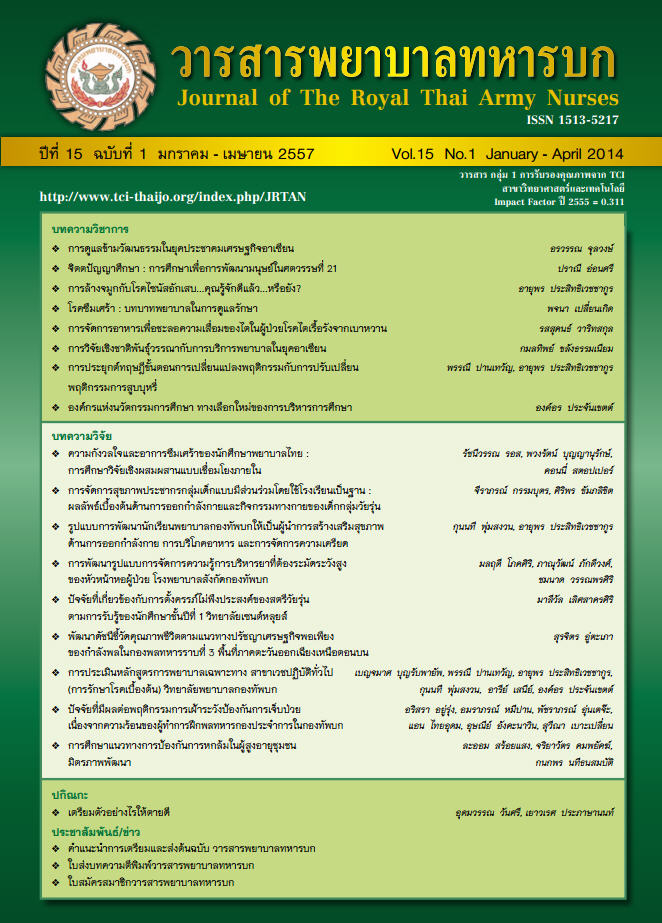การล้างจมูกกับโรคไซนัสอักเสบ...คุณรู้จักดีแล้ว...หรือยัง? Do you know about relation of Rhinosinusitis and nasal Irrigation?
Keywords:
ไซนัสอักเสบ, RhinosinusitisAbstract
โรคไซนัสอักเสบเป็นโรคที่พบได้บ่อยและเป็นสาเหตุหนึ่งที่ส่งผลกระทบต่อชีวิตประจำวัน ทั้งในการเรียน การทำงานและเสียค่าใช้จ่ายในการรักษาเป็นจำนวนมาก ซึ่งการรักษาสามารถทำได้หลายวิธีควบคู่กันไป ทั้งการรักษาด้วยการรับประทานยา พ่นยา และล้างจมูก ซึ่งการล้างจมูกด้วยน้ำเกลือเป็นวิธีที่ใช้ร่วมในการรักษาผู้ป่วยโรคภูมิแพ้จมูก ไซนัสอักเสบเรื้อรัง ผู้ป่วยที่ติดเชื้อทางเดินหายใจส่วนบนและลดความชุกของการเกิดซ้ำมาช้านาน โดยน้ำเกลือช่วยเพิ่มอัตราเร็วของขนกวัด ทำให้เกิดเส้นเลือดหดตัว ช่วยชะล้างสิ่งที่เป็นตัวกระตุ้นต่างๆ ออกไป รวมทั้งลดจำนวนแบคทีเรียที่สะสม และชะล้างหนองที่สะสมในโพรงจมูกดังนั้นจะเห็นได้ว่า การล้างจมูกจึงมีส่วนร่วมในการรักษาโรคไซนัสอักเสบที่สำคัญ ถึงแม้ว่าในปัจจุบันเทคโนโลยีในการรักษาโรคไซนัสอักเสบจะมีเครื่องมือที่ทันสมัยเข้ามาร่วมด้วย แต่สิ่งที่ดีที่สุด ก็คือการป้องกันไม่ให้เกิดโรค
Rhinosinusitis is a common disease. It has an impact on daily behavior such as studying and working and the cost of treatment is very expensive. The treatment of rhinosinusitis has many methods: oral medication, nasal spray and nasal irrigation.Over the past decades, nasal saline irrigation is an adjunctive treatment for allergic rhinitis, chronic rhinosinusitis, in patients with upper respiratory tract infection and decreases prevalence of recurrent disease. Saline irrigation increases mucociliary function, causes vasoconstriction, washes out irritants nasal secretion and decreases bacterial reservoirs. So the nasal irrigation has important involved in present of rhinosinusitis treatment. Although the treatment of rhinosinusitis has new technology devices but the most important is the prevention of the disease.
Downloads
Downloads
How to Cite
Issue
Section
License
บทความหรือข้อคิดเห็นใดใดที่ปรากฏในวารสารพยาบาลทหารบกเป็นวรรณกรรมของผู้เขียน ซึ่งบรรณาธิการหรือสมาคมพยาบาลทหารบก ไม่จำเป็นต้องเห็นด้วย
บทความที่ได้รับการตีพิมพ์เป็นลิขสิทธิ์ของวารสารพยาบาลทหารบก
The ideas and opinions expressed in the Journal of The Royal Thai Army Nurses are those of the authors and not necessarily those
of the editor or Royal Thai Army Nurses Association.






